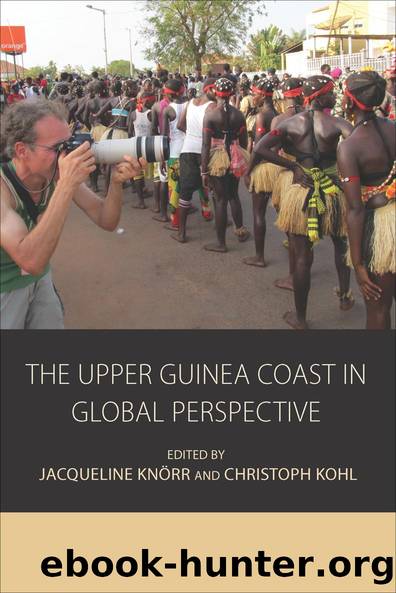The Upper Guinea Coast in Global Perspective by Jacqueline Knörr Christoph Kohl

Author:Jacqueline Knörr, Christoph Kohl [Jacqueline Knörr, Christoph Kohl]
Language: eng
Format: epub
ISBN: 9781785333736
Google: CLRVAQAACAAJ
Publisher: Berghahn Books
Published: 2016-01-15T05:21:43+00:00
Across the Ocean: Towards Affection
My analysis of the semantic changes of the word tabanka could end here, and the reader could go directly to my concluding remarks. However, I choose to take a more audacious stance and face the semantic turbulences that might have affected the core meaning of this word in its likely journey to the New World. The modal used to express probability or condition and the journeyâs depiction as but a possibility indicate that we are navigating an ocean of speculations that are hardly falsifiable. There is both ônus and bônus in such an endeavour. The price we risk paying is widely known: we might be facing a case of false cognate. I firmly believe, however, that we cannot be charged much for it, because one âcan never tell where a word comes fromâ when dealing with language contact in a diffuse setting (Le Page 1998: 66).11 On the other hand, two bonuses might await us at the finishing line. The first would be the refutation of the allegation of false cognate, which would mean gaining an extra layer of knowledge about the historical flows from the African coast to the Caribbean Islands. The second is somewhat independent of the ônus and has to do with the general hypothesis of this work, namely, that intersocietal encounters (in our case, between creolized ecumenes) stir up semantic turbulences in classificatory categories, values and symbols. In the case of encounters between creolized ecumenes, semantic changes affecting a particular cultural category tend to preserve part of the previous meaning it had in its original setting.
The word tabankaâs journey from the Guinea coast to the Cape Verde islands and the surface semantic shifts that occurred during its travels are related to the unremitting intercommunication between ecumenes (i.e. that of the Upper Guinea Coast, and the Luso-African ones) in the context of the creolization process that gave birth to a Creole society in Cape Verde. These long-term intersocietal encounters would likely have caused some kind of social and cultural turbulence powerful enough to shake the cultural kit of conceptual tools for thinking and conceiving sociability, conviviality, security and protection while still maintaining some degree of continuity with the deep semantic core of the root *abank(?).
I now turn, very briefly, to a supposedly third moment of the tabanka trip, stopping strategically on the island of Trinidad off the coast of Venezuela. Here the word means neither a village (fortified or not) nor a mutual aid institution that manages reciprocity within and across villages. Revealing yet another semantic transformation, the Trinidadian tabanka refers to a specific kind of suffering and oppression, somewhat similar to a state biomedicine classifies as a psychopathology. According to anthropologist Roland Littlewood (1998: 121), it refers to âthe inappropriate psychological response to desertionâ. This is a working-class cultural category, unlike the idea of adultery, which is restricted to middle-class settings. It happens when a manâs wife abandons him, particularly for another man, and the abandoned husband succumbs to loss and misery rather than resume life as usual.
Download
This site does not store any files on its server. We only index and link to content provided by other sites. Please contact the content providers to delete copyright contents if any and email us, we'll remove relevant links or contents immediately.
Migrants and Strangers in an African City by Bruce Whitehouse(154)
Archives of the Empire by Vol II(121)
Four Months Besieged by Henry H. S. Pearse(114)
Mennonites and Post-Colonial African Studies by John M. Janzen Harold F. Miller John C. Yoder(108)
The Last Journals of David Livingstone, in Central Africa, From 1865 to His Death, Volume I (Of 2), 1866-1868 by David Livingstone(106)
More Philosophy and Opinions of Marcus Garvey by Amy Jacques Garvey(102)
South Africa and the Transvaal War, Vol. 4 (of 8) by Louis Creswicke(102)
South Africa and the Transvaal War, Vol. 6 (of 8) by Louis Creswicke(102)
Outsourcing African Labor by Jeffrey Gunn(94)
A History of the AbaThembu People from Earliest Times To 1920 by Jongikhaya Mvenene(94)
The Upper Guinea Coast in Global Perspective by Jacqueline Knörr Christoph Kohl(92)
Ismailia by Baker Samuel White Sir(91)
State and Culture in Postcolonial Africa by TEJUMOLA OLANIYAN(91)
An Account of Timbuctoo and Housa Territories in the Interior of Africa by Shabeeny Abd Salam active 1820(88)
Travel and the Pan African Imagination by Tracy Keith Flemming(84)
Our Gigantic Zoo by Thomas M. Lekan(73)
Struggles for Self-Determination: The Denial of Reactionary Statehood in Africa by Josiah Brownell(70)
The Record of a Regiment of the Line by Mainwaring George Jacson(65)
Landlords And Strangers: Ecology, Society, And Trade In Western Africa, 1000-1630 by George E. Brooks(51)
